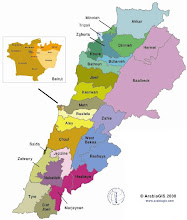 In Lebanon the debate over whether the voting age should be lowered from 21 to 18 has been prominent in the lead up to the general elections in June of this year. Despite the debate ending in paralysis and the voting age remaining at 21; the drive to lower the voting age to 18 continues with the 2010 municipal elections targeted. Nahwa al-Muwatiniya (NA-AM) a local Lebanese NGO and, with the assistance of IFES, in their project Baddi Koun Mas’oul is ensuring that if the voting age is lowered then the youth are not left subservient to the Lebanese electoral system. NA-AM through their project Baddi Koun Mas’oul is educating and empowering students across the country through informing them of their rights and duties with regard to voting and educating them about the democratic process.
In Lebanon the debate over whether the voting age should be lowered from 21 to 18 has been prominent in the lead up to the general elections in June of this year. Despite the debate ending in paralysis and the voting age remaining at 21; the drive to lower the voting age to 18 continues with the 2010 municipal elections targeted. Nahwa al-Muwatiniya (NA-AM) a local Lebanese NGO and, with the assistance of IFES, in their project Baddi Koun Mas’oul is ensuring that if the voting age is lowered then the youth are not left subservient to the Lebanese electoral system. NA-AM through their project Baddi Koun Mas’oul is educating and empowering students across the country through informing them of their rights and duties with regard to voting and educating them about the democratic process. The Baddi Koun Mas’oul project is structured into a four to six hour session and is done with a group of roughly 50 students that are 16 to 17. These students are taken through a nine step process that takes them through the different aspects of the democratic process. Within this nine step process the students are introduced to different democratic ideas such as the difference between a majority and proportional electoral system. The students are also informed of their rights and duties as responsible citizens within the context of the democratic system and the ethical standards required for the integrity of the electoral procedure. Students then learn about more technical issues concerning elections that include: election administration, observation and media regulations. The program is being rolled out in 52 state schools across the country in both rural and urban areas.
In the village of Diddeh based in Northern Lebanon, 53 excited 16 year olds listened to Tamim Bou Karroun, the Project Coordinator for Nahwa al-Muwatin. Bou Karroun and six trainees organized the students into groups to form the election administration body two observer teams and three political parties. The youth quickly arranged themselves into their different parties that they then named and debated about what their demands would be. The three parties they formed were Reform and Future, Our Voice and Black Hand. Demands were made such as: refurbishing the school, realizing student needs and teaching more foreign languages apart from English, Arabic and French that are already on offer! After the nominated spokesperson from each party read out the demands, the youth were then were ready to vote for who they wanted to elect. “We do two elections for the youth to show them the difference between a proportional election system and a majority,” said Tamim Bou Karroum. Election booths were set up with the help of a black curtain and some sticky tape while the electoral administrators ensured that each voter was registered, allowed to vote in private and ticked off the electoral list. After all the votes were in each vote was read out, accompanied by much excitement as to who would win. In the end it was a tie with each party gaining one seat each and three votes being cancelled.

As Nahwa al-Muwatiniya continues this project to other schools across the country it is allowing hundreds of pupils to gain their first real exposure to the culture and process of democracy. While it is likely that many of the students involved in this project will not get the chance to vote until they are 21; Baddi Koun Mas’oul is preparing the ground if the law is changed by ensuring that the very people whom this law may apply to are made aware of what it means to be engaged in the electoral process. Most importantly Baddi Koun Mas’oul is engaging young people in the process of democracy and embedding the concepts that come with the democratic process. Nahwa al-Muwatiniya through Baddi Koun Mas’oul is building a firmer foundation within the youth of the democratic process, from which Lebanon will hope, to build a stronger democratic system.




No comments:
Post a Comment